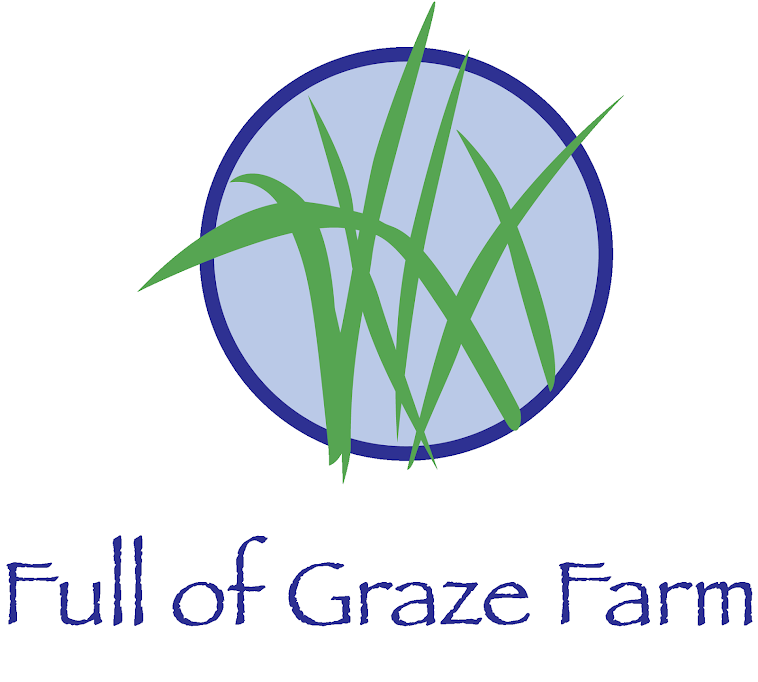"Okay, so I'm ready to start the investigation into where my food comes from and how it's produced but I don't know where to start (and I don't want to be grossed out in the process). Where do I start?"
Well, that all depends on the type of person you are and how much you want to know. It's true, there are plenty of books and documentaries out there that will make you look askance at our Standard American Diet (SAD, for short) and quite possibly make you ill. I've read/seen a few and I just can't recommend them. At least not to start. In my opinion, it is better to face the facts in a gentle, non-nauseating way than to purge all your old eating habits in one day. As in anything in life, it is better to choose something because you see why it's good for you than to choose it because the alternative is bad. Choosing good food over bad food is like choosing heaven because God is there and not just because you fear hell...And trust me, pastured products are truly heavenly!
Here are Full of Graze's best suggestions for reading materials:
If you are a mom or dad, one of the most influential books I've ever read on the topic of food is Dr. Sears' Healthiest Kid in the Neighborhood. Will it convince you to move strictly to pastured meats and eggs? Nope. But he will give you all the reasons why you should completely eradicate junk foods from your family's diet, and by junk food he means foods that are highly processed, with many preservatives, food colorings, and harmful substances such as high fructose corn syrup and hydrogenated oils. Backed by a Harvard medical education and decades of experience as a pediatrician, Dr. Sears voice is one of reason and common sense, and he shares lots of practical tips and lists of the best "grow foods" for your family. It can get a little scientific at times, but not distractingly so. It will move you far from a junky diet to wholesome health!
To gain a good understanding of where our food comes from and how it's produced, read Michael Pollan's Omnivore's Dilemma. It is the most accessible, intelligible, and witty journalistic text on the topic of food out there today. And, no, it will not divulge all the details that will make your skin crawl and stomach turn. It approaches food from the perspective of the average buyer, and investigates how food is produced using conventional, industrial means; how it is produced on a small, family-run, pasture-based farm; and how it can be had by a hunter/gatherer in the modern world. No need to buy the book as it should be available in your local library. (If it's not, request it. They'll get it for you!) I HIGHLY RECOMMEND reading one chapter of this book, the one that explains the benefits of pasture-based farming using a rotational method of grazing with a variety of animals. If that is all you read, you will have read enough to know why we farm the way we farm at Full of Graze!
The third step you should take in your food investigation is to read Barbara Kingsolver's Animal, Vegetable, Miracle. This memoir tells the store of how one family lived for an entire year on the food they could either produce themselves or buy from local sources. It will not only educate you about food production but also inspire you to eat locally and seasonally, for your bodily health, for the health of your local community, and for the health of our natural resources! While it isn't realistic for most families in our society to live that radically with regard to food, it will certainly convict you to do the best you can.
Happy reading and happy eating!!


Great resource suggestions. I have not read the first one by Dr. Sears, but sounds like I should. I really like the other two - I was surprised at how readable The Ominvore's Dilemma was (in fact I just started rereading it last week) and the Kingsolver book was just a lot of fun to read. We listened to that on a road trip and the kids even enjoyed the parts they stayed awake for =)
ReplyDeleteThanks for the feedback, Lori! I hope you like Dr. Sears' book, and please let me know if you have any good book recommendations on the topic of food. I'll be sure to check them out.
ReplyDeleteI will admit that I am not the avid reader Sarah is, but I do find it necessary, as a mom, to read about how things affect the health of my children. For me, I found The Unhealthy Truth, by Robyn O'Brien to be a bit easier to get through than Micheal Pollan's book. I liked the mom perspective and she has great information, as well as resources, on her website: www.allergykids.com
ReplyDelete